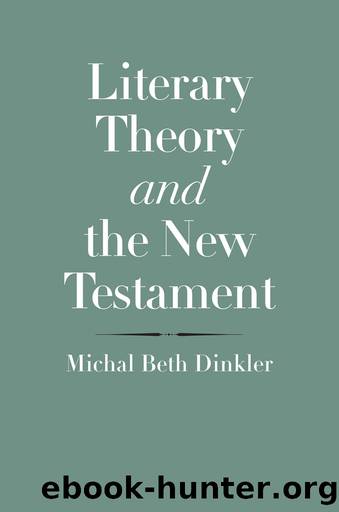Literary Theory and the New Testament by Michal Beth Dinkler;

Author:Michal Beth Dinkler;
Language: eng
Format: epub
Publisher: Yale University Press
Published: 2019-07-14T16:00:00+00:00
6
The Corinthian Corpus and Epistolary Embodiment: Reading Paul’s Epistles with Affect Theorists and Ecocritics
For now, we see through a glass in obscurity;
but then face to face: now I know in part;
but then shall I know fully.
1 Corinthians 13.12
Whereas the last chapter focused on narrative, this chapter turns to the epistolary literature of the New Testament. Specifically, we’ll consider the two extant epistles sent by the apostle Paul to the ekklesia in Corinth, which are so concerned with matters of literary interpretation that Margaret Mitchell has called them “a correspondence course in practical, indeed, tactical hermeneutics.” In this chapter, I seek to challenge traditional scholarly modes of approaching Paul’s epistles to the Corinthians by engaging two recent trends in poststructuralist literary criticism: the move to draw on affect theory, and the increased interest in ecocriticism.
As Mitchell rightly says, Paul’s correspondence course in hermeneutics is practical. At the same time, we shouldn’t let modern associations with practicality cloud the fact that it is also intensely personal and deeply emotional. Paul takes a particularly heated tone in chapters 10–13 of the second letter, where he famously defends himself against some opponents who are typically associated with the “super apostles” of 2 Corinthians 11.5 and 12.11. In “the first recorded moment of Pauline interpretation by someone other than Paul himself,” we learn their complaint: “His letters are weighty and powerful, but the bodily presence weak, and the spoken word (logos) contemptible” (2 Cor. 10.10). Instead of denying that his physical self-presentation drastically differs from his epistolary self-presentation, Paul appears to corroborate it, admitting that he is “humble when face to face with” the Corinthians yet “bold” in his writing (2 Cor. 10.1).
Pauline scholars tend to accept that Paul’s “authorial parousia is at such odds with the epistolary parrêsia.”1 Historical critics especially have proffered numerous hypotheses about Paul’s purported bodily defects (his “weak” body) and lauded his rhetorical prowess (his “bold” writing).2 The consequence of accepting this claim at face value, however, is that Pauline interpreters unintentionally reinscribe the argument of Paul’s opponents. Like the super apostles, scholars pit Paul’s powerful epistolary voice over and against his “weak” body, thereby maintaining a strict binary between Bold Epistolary Paul and Weak Corporeal Paul.
That binary becomes even more problematic when juxtaposed with another commonplace in Pauline scholarship: the assumption that epistles indicate absence and lack, while physical bodies represent presence and power. This view reverses the prior dichotomy, creating a Weak Epistolary Paul and a Bold Corporeal Paul. Paul also seems implicitly to support this assumption, assuring the Corinthians that, although “absent in body,” he is “present in spirit” (1 Cor. 5.3), and referring repeatedly to his desire to visit them in person (see, for example, 2 Cor. 12.14; 13.1). A letter, from this perspective, constitutes a less appealing, less powerful stand-in for an absent Paul (Weak Epistolary Paul), in contrast to his (obviously preferable) physical presence (Bold Corporeal Paul).
The quintessential example of this perspective in modern scholarship is Robert Funk’s widely accepted thesis regarding “apostolic parousia.”
Download
This site does not store any files on its server. We only index and link to content provided by other sites. Please contact the content providers to delete copyright contents if any and email us, we'll remove relevant links or contents immediately.
| Ancient & Classical | Arthurian Romance |
| Beat Generation | Feminist |
| Gothic & Romantic | LGBT |
| Medieval | Modern |
| Modernism | Postmodernism |
| Renaissance | Shakespeare |
| Surrealism | Victorian |
4 3 2 1: A Novel by Paul Auster(11035)
The handmaid's tale by Margaret Atwood(6839)
Giovanni's Room by James Baldwin(5873)
Big Magic: Creative Living Beyond Fear by Elizabeth Gilbert(4719)
Asking the Right Questions: A Guide to Critical Thinking by M. Neil Browne & Stuart M. Keeley(4567)
On Writing A Memoir of the Craft by Stephen King(4206)
Ego Is the Enemy by Ryan Holiday(3983)
Ken Follett - World without end by Ken Follett(3968)
The Body: A Guide for Occupants by Bill Bryson(3791)
Bluets by Maggie Nelson(3705)
Adulting by Kelly Williams Brown(3663)
Guilty Pleasures by Laurell K Hamilton(3578)
Eat That Frog! by Brian Tracy(3509)
White Noise - A Novel by Don DeLillo(3430)
The Poetry of Pablo Neruda by Pablo Neruda(3358)
Alive: The Story of the Andes Survivors by Piers Paul Read(3304)
The Bookshop by Penelope Fitzgerald(3222)
The Book of Joy by Dalai Lama(3212)
Fingerprints of the Gods by Graham Hancock(3207)
